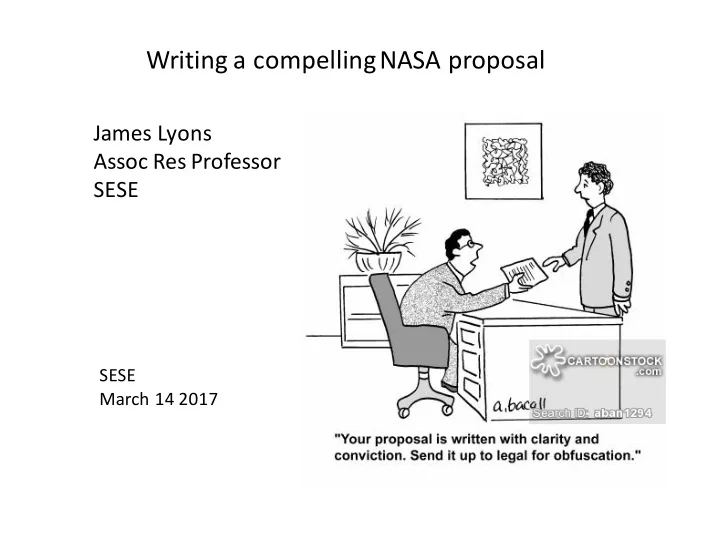

Writing a compelling NASA proposal James Lyons Assoc Res Professor SESE SESE March 14 2017
According to Dr. Francis Collins, Director of the NIH, “So many worthwhile research ideas get put into the unfunded category in reviews because the proposals are not written clearly and don’t present the importance of the research forcefully enough.”
Writing a NASA R&A proposal 1. When to write a proposal 2. NASA proposal opportunities 3. How to write a compelling NASA proposal 4. The fate of your proposal nspires.nasaprs.com – set up an account! ROSES Research Opportunities in Space & Earth Sciences GUIDEBOOK FOR PROPOSERS RESPONDING TO A NASA FUNDING ANNOUNCEMENT
When to write a proposal When you need funds (salary, support) When you publish or are about to publish in a high profile journal When a discovery/new direction occurs in a field When you make a discovery/have an idea that keeps you up at night (for many nights)
Organizing your proposal Scientific/Technical/Management section (15 pp): 1. Introduction – executive summary 1.1 Objectives and Expected Significance 1.2 Relevance to the NASA program 2. Overview of problem - set the stage here!! 3. Progress in last funding cycle 4. Approach and Methodology – details of what you are proposing to do 5. Perceived impact – tell them why it’s important 6. Work plan – who will do what Not part of the 15 pp: References Facilities CV’s, budget stuff, letters. etc.
Tips for writing a compelling proposal https://doresearch.stanford.edu/research-scholarship/about-proposals/ successful-proposal-writing#how-to-write-a-compelling-grant-proposal Stick with the format Organize your application to effortlessly guide reviewers through it. This creates an efficient evaluation process and saves reviewers from hunting for critical information (and minimizes cranky reviewer syndrome)
Tips - 2 Plan ahead Think about the budget and how it is related to your research plan. Everything in the budget must be justified by the work proposed. Don't propose more work than can be done during the project period. Make no assumptions Include enough background information. A cover letter can help the sponsor assign your application to the correct sub-panel.
Tips - 3 Organize your thinking Create an outline following the suggested proposal format. Write one sentence summarizing each main point in the outline. Make the case Make the case for why the sponsor should fund your research. Tell reviewers why testing your hypothesis is worth their money, why you are the person to do it, and how your institution can give you the support you'll need to get it done.
Tips - 4 Keep it simple Make one point in each paragraph. This is key for readability. Keep sentences to 20 words or less. Use the active, rather than passive, voice. Be succinct Use a clear and concise writing style for the non-expert. Make your points as directly as possible. Use basic English, avoiding jargon or excessive language. Spell out all acronyms on first reference. Be consistent with terms, references, and writing style.
For an extra edge Focus on ‘big’ problems – know what these are for your field/program Try bold, new approaches – but justify them thoroughly Put together a team that hasn’t worked together before. Interdisciplinarity is (usually) a good thing. Write well! Make it a story, and make it interesting to read
The fate of your proposal All proposals go to the NASA program manager(s) for the relevant program . NASA will put out a request for panel members. Postdocs – volunteer for panels! Eventually….., the panel meets. It breaks up into subpanels of ~10 members each reviewing ~10-20 proposals in 4 days. Your proposal is reviewed and ranked for the program managers. A summary panel review of your proposal is written and vetted. The program manager makes recommendations to the selecting officer. Your are notified if ‘selectable’, and eventually….if selected, or not.
Recommend
More recommend